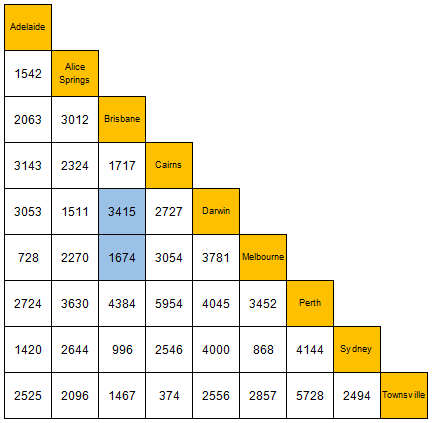
Travelling to Australia for the first time? Here’s some info on the country’s road rules, which will be important to know if you’re thinking of booking a rental car with VroomVroomVroom.
With large distances between major cities, and long expanses of country road, driving through Australia can make for a great adventure. Some key things to remember are that Aussies drive on the left-hand side of the road, speed limits and distances are denoted in kilometres (rather than miles), and driving under the influence of alcohol is generally not permitted.
Here are a few other driving tips for the Land Down Under:
Here is a table representing the distances (in kilometres) between some of Australia's most popular destinations. Travel time between cities can be quite extensive, particularly if you are travelling interstate, so be sure to map out your journey before setting off, and account for plenty of stops along the way.
It’s compulsory to wear a seat belt whilst travelling in any vehicle that has them; this includes buses that are fitted with seat belt restraints. Only one person per seat belt means that sharing it with someone else (even a child) is both unsafe and illegal. Children aged seven and up can wear adult seat belts or use booster seats. For kids under seven, there are specific ways to best secure them. Check out our guide on child seats .
Read here to find more information on seat belt rules and regulations.
Speed limits vary throughout Australia and are measured in kilometres per hour (km/h). The speed limit usually ranges between 40 km/h in suburban areas and school zones to 120 km/h on major freeways.
Most residential zones sit at 50 km/h, and as a general rule, it’s good practice to drive at 50 km/h if you are uncertain of the speed limit. There are plenty of signs around, however, so keep your eye out as speed limits can change from one area to the next.
Read here for more information on speed limits.
Speeding Fines
As the majority of road incidents in Australia result from speeding, speed limits are heavily enforced by police in Australia, particularly around peak holiday and travel periods such as Christmas. It’s not uncommon for penalties and fines to be doubled during these periods.
Police are equipped with a number of methods for speed detection, and utilise them all across the country from suburban backstreets to rural highways. These methods include:
The rental car supplier will take one of the following actions:
The registered driver is required to pay the fine within 28 days of receiving notice. In any case, it’s advisable that you pay any fines you receive before leaving the country. Failure to do so may result in refusal of service from rental car suppliers, refusal of entry into Australia, or cancellation of a visa on a return visit.
Drink driving, or driving under the influence of alcohol or illicit substances, is a serious offence in Australia. Police have the authority to stop a driver at any time and conduct a random breath test. The legal limit in most places is 0.05 of blood alcohol concentration (BAC). In New South Wales, however, the limit for a person driving a car hire is 0.02. This only applies to drivers who hold a full licence. For learners and probationary drivers, a zero BAC must be adhered to, while the person accompanying a learner driver must not exceed the 0.05 BAC limit.
If you are found to be over the legal limit, you may be arrested and required to take a full blood test at a hospital or health institution.
Learn more about the rules around drink driving here.
Using a mobile phone whilst driving is illegal in all Australian states and territories. If you have a mobile phone with you in your car, it may only be used in a hands-free capacity to make or receive calls, open navigation apps, or play music. If your mobile phone is not mounted and secured in a dock or appropriate hands-free mechanism, then you will not be legally allowed to touch or use the phone.
Keep in mind that any other functions such as Facebook, email, and instant messaging are also prohibited. If you need to check your messages, you’ll need to pull over in a safe place to do so, and in some states, you’ll also be required to turn off your car before touching your phone.
Learn more about the road rules for mobile phones here.
It’s illegal to park your car on restricted roadsides. These areas are generally indicated by signage—or otherwise by yellow lines along the curb. “No parking" zones, clearways, loading zones, and designated bus zones all fall into the category of restricted parking areas, however it’s best practice to check the signs as there may be time-based exceptions. In any case, we recommend parking in designated spaces, or better yet, in a secure car park or lot.
It’s important to obey all parking signs to avoid being issued a fine. To better understand Australian parking signs, read here.
For airport parking, we’ve compiled a list of providers spanning Australia’s major airports to help you find the best airport parking deal.
Planning on renting a car? Read about the car rental process in Australia for more information.
You can also read about the rental car return process. Safe travels!
